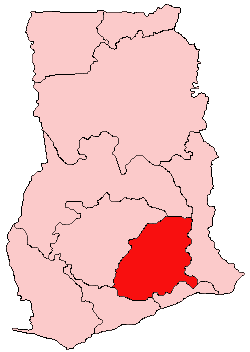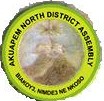Related Research Articles

Asante, also known as Ashanti, Ashante, or Asante Twi, is one of the principal dialects of the Akan language. It is one of the three literary dialects of Akan, the others being Akuapem and Fante. There are over 3.8 million speakers of the Asante dialect, mainly concentrated in Ghana and southeastern Cote D'Ivoire, and especially in and around the Ashanti Region of Ghana.

Akan is the largest language of Ghana, and the principal native language of the Akan people, spoken over much of the southern half of Ghana. About 80% of Ghana's population speak Akan as a first or second language, and about 44% of Ghanaians are native speakers. Akan is also spoken across the border in parts of Côte d'Ivoire.
The Akan people are a Kwa group living primarily in present-day Ghana and in parts of Ivory Coast and Togo in West Africa. The Akan speak languages within the Central Tano branch of the Potou–Tano subfamily of the Niger–Congo family. Subgroups of the Akan people include: the Agona, Akuapem, Akwamu, Akyem, Anyi, Ashanti, Baoulé, Bono, Chakosi, Fante, Kwahu, Sefwi, Wassa, Ahanta, Denkyira and Nzema, among others. The Akan subgroups all have cultural attributes in common; most notably the tracing of royal matrilineal descent in the inheritance of property, and for succession to high political office. All Akans are considered royals in status, but not all are in royal succession or hold titles.
Okomfo Anokye was the first priest (Okomfo) of the Ashanti Empire. Anokye is known for his participation in the expansion of the empire. He was also the codifier of the constitution and laws of the Ashanti Empire.

Kwahu or Kwawu is an area and group of people that live in Ghana and are part of the Twi-speaking Akan group. The region has been dubbed Asaase Aban, or the Natural Fortress, given its position as the highest habitable elevation in the country. Kwahu lies in the Eastern Region of Ghana, on the west shore of Lake Volta. The Kwahus share the Eastern Region with the Akyem and Akuapem, as well as the Adangbe-Krobos. Among Kwahu lands, a significant migrant population works as traders, farm-hands, fisherfolk, and caretakers in the fertile waterfront 'melting pot' of Afram plains. These migrants are mostly from the Northern and Volta Regions, as well as, some indigenous Guans from the bordering Oti and Brong-Ahafo regions live in the Afram Plains area. Kwahus are traditionally known to be wealthy traders, owning a significant number of businesses and industries in Ghana.

Fante, also known as Fanti, Fantse, or Mfantse, is one of the three literary dialects of the Akan language, along with Asante and Akuapem, with which it is mutually intelligible. It is principally spoken in the central and southern regions of Ghana as well as in settlements in other regions in western Ghana, Ivory Coast, as well as in Liberia, Gambia and Angola.

Ghana is a multilingual country in which about eighty languages are spoken. Of these, English, which was inherited from the colonial era, is the official language and lingua franca. Of the languages indigenous to Ghana, Akan is the most widely spoken in the south. Dagbani, Dagare, Sisaala, Waale, and Gonja are among the most widely spoken in the northern part of the country.
Articles related to Ghana include:

The Akyem are an Akan people. The term Akyem is used to describe a group of four states: Asante Akyem, Akyem Abuakwa, Akyem Kotoku, and Akyem Bosome. These nations are located primarily in the eastern region in south Ghana. The term is also used to describe the general area where the Akyem ethnic group clusters. The Akyem ethnic group make up between 3-4 percent of Ghana's population depending on how one defines the group and are very prominent in all aspects of Ghanaian life. The Akyem are a matrilineal people. The history of this ethnic group is that of brave warriors who managed to create a thriving often influential and relatively independent state within modern-day Ghana. When one talks of Ghanaian history, there is often mention of The Big Six. These were six individuals who played a big role in the independence of Ghana. Of the big six, people of Akyem descent made up the majority.
Akwamu was a state set up by the Akwamu people in present-day Ghana. After migrating from Bono state, the Akan founders of Akwamu settled in Twifo-Heman. The Akwamu led an expansionist empire in the 17th and 18th centuries. At the peak of their empire, Akwamu extended 400 kilometres (250 mi) along the coast from Ouidah, Benin in the East to Winneba, Ghana, in the West.

Akropong is a town in South Ghana and is the capital of the Akuapim North District, a district in the Eastern Region of South Ghana. This town is known for producing snails and palm oil. Akropong has a 2013 settlement population of 13,785 people.
Twi is the common name of the Akan literary dialects of Asante and Akuapem. Effectively, it is a synonym for 'Akan' that is not used by the Fante people. It is not a linguistic grouping, as Akuapem Twi is more closely related to Fante dialect than it is to Asante Twi. Twi generally subsumes the following Akan dialects: Ahafo, Akuapem, Akyem, Asante, Asen, Bono, Dankyira and Kwawu, which have about 4.4 million speakers in southern and central Ghana.
Akuapem, also known as Akuapim, Akwapem Twi, and Akwapi, is one of the literary dialects of the Akan language, along with Asante and Fante, with which it is mutually intelligible. There are 626,000 speakers of Akuapem, mainly concentrated in Ghana and southeastern Cote D'Ivoire. It is the historical literary and prestige dialect of Akan, having been chosen as the basis of the Akan translation of the Bible.
Akuapim-Mampong is a town in the Akuapim North district of the Eastern Region of Ghana. It shares boundaries with Mamfe. It is famous for being the first place cocoa was planted in Ghana by Tetteh Quarshie.
Of the populated places in the Eastern region of Ghana, Larteh Akuapem is the capital of the Benkum Division of the Akuapem Traditional Council. It lies on the east of the ridge on the Akonnobepow.
Akwamufie is the ceremonial state and seat capital of the Akwamu people. It is located along the Akuapim-Togo range, the Volta River and in the Eastern Region, Ghana. It is the town where Regent Chief, Odeneho Kwafo-Akoto III along with Regent Queen Nana Afrakoma II reside and administer their operations. The majority of the divisional chiefs and sub chiefs also reside in Akwamufie. Akwamu State or Kingdom consists of thirty six towns of which Akwamufie is the capital. While the Paramount Chief is the Head of Akwamu State (Akwamuman), the occupant of the Osomanyawa Stool; the Senior Divisional Chief is the Akwamufiehene and he is second in command to the Akwamuhene, Paramount Chief, Odeneho Kwafo Akoto III.
Amanokrom is a town in the Akuapim North District of the Eastern Region of Ghana. It shares border with Mamfe and Abotakyi

The Christ Presbyterian Church, formerly known as the Basel Mission Church, Akropong, is a historic Protestant church located in Akropong–Akuapem, Ghana. It is the first Presbyterian Church to be established in Ghana. It was founded in 1835 by Andreas Riis, a Danish minister and missionary of the Basel Mission who was the only congregant at the time. After years of dormancy, the church began to flourish after the arrival of the Moravian missionaries from the West Indies in 1843. The Basel missionary, Johann Georg Widmann was appointed the minister-in-charge of the Akropong church in 1845. The Jamaican missionary, John Hall, who had served as an elder in his home church in Irwin Hill, Montego Bay, became the first Presbyter of the church while Alexander Worthy Clerk became the first Deacon. Liturgical services are conducted in English and the Twi language.
Clement Anderson Akrofi was an ethnolinguist, translator and philologist who worked extensively on the structure of the Twi language under the aegis of the Presbyterian Church of Ghana.
References
- 1 2 3 "AFRICA | 101 Last Tribes - Akuapem people". www.101lasttribes.com. Retrieved 7 June 2023.
- ↑ Olson, James Stuart (1996). The peoples of Africa: an ethnohistorical dictionary. Santa Barbara, CA: Greenwood Press. p. 18. ISBN 978-0-313-27918-8.
- ↑ Ayesu, Ebenezer (1 January 2013). "One state, many origins : peopling of the Akuapem State : a re-examination". Contemporary Journal of African Studies. 1 (1): 27–54. ISSN 2343-6530.